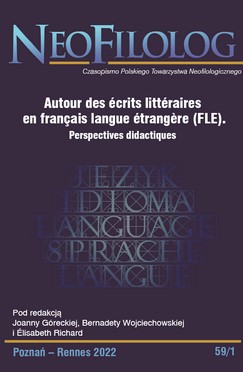Les poèmes en classe de FLE, à l’exemple des méthodes choisies au niveau secondaire dans la perspective de la théorie de sociodynamique d’Abraham Moles
Poems in the EFL class, as an example of methods applied at secondary level of education in the perspective of Abraham Moles’ theory of sociodynamics
Author(s): Beata Kędzia-KlebekoSubject(s): Foreign languages learning, Language acquisition, Pedagogy
Published by: Uniwersytet Adama Mickiewicza
Keywords: sociodynamic theory of culture; cultural object; school culture; poem; teachable object; CEFR; FLE;
Summary/Abstract: Our culture is in constant development and, according to the theory of A. Moles, is subject to the socio-cultural dynamics of transformation, to which all objects of culture are subject. The school institution participates in the creation of culture by awakening interests, and transmitting knowledge, but this is done in the context of all the transformations that social culture is undergoing and in accordance with the understanding of this culture, formed in the spirit of contemporary challenges. The subject of this study will therefore be poetry as an object of culture, but also as an object of school culture. The aim of this article is to analyse the place and role of poetry in contemporary FLE teaching, embedded in the CEFR curriculum. In the first part of this article, we will therefore trace definitions and concepts related to Circuit of Culture theory of objects in the spirit of the theory of socio-dynamics of culture. Then we will devote our attention to literature and its representation in school culture and finally we will focus on the CEFR curriculum and the role of literature and poetry in the teaching of FLE, based on a few selected techniques used at secondary school in a class with an extended French curriculum. Quantitative and qualitative analyses of poetry texts from selected French textbooks reveal that the poetry taught in the FFL classroom is subject to the same dynamics as poetry as a cultural object in cultural circulation in contemporary society. Its place is reduced, which, however, does not mean it has completely disappeared. The interest of teachers and students in this form of expression of human thought which can still arouse admiration for its cognitive, aesthetic and emotional values remains a condition for its continuing presence.
Journal: Neofilolog
- Issue Year: 59/2022
- Issue No: 1
- Page Range: 111-123
- Page Count: 13
- Language: French

